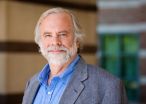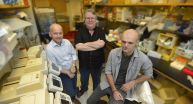(Press-News.org) CHAMPAIGN, Ill. — A new study offers fresh insights into how talking on a cell phone or to a passenger while driving affects one's performance behind the wheel. The study used a driving simulator and videophone to assess how a driver's conversation partner influences safety on the road.
"We've done years of study on driver distraction, and previous studies suggest that passengers often aren't distracting. In fact, passengers can be helpful, especially if they're adults who have had experience and also are active drivers themselves," said University of Illinois psychology professor and Beckman Institute director Arthur Kramer, who led the research with postdoctoral fellow Kyle Mathewson and graduate student John Gaspar. Mathewson is now a professor of psychology at the University of Alberta.
The researchers hoped to discover which aspects of talking to a passenger most affect a driver's performance – rather than talking to someone on a cell phone, which is often dangerous. To do this, they set up four driving scenarios: a driver alone in the simulator, a driver speaking to a passenger in the simulator, a driver speaking on a hands-free cell phone to someone in a remote location, and a driver speaking on a hands-free cell phone to someone in a remote location who could see the driver and observe the driving scene out the front windshield via videophone.
The drivers (all participants were college-age students) confronted a fairly challenging highway scene that involved merging and navigating around unpredictable drivers in other cars. The researchers kept track of the study drivers' lateral moves, distance from other cars, speed, collisions, and ability to find and take a designated exit.
"We also recorded their speech as they talked to their partner in three out of the four conditions, and we looked at where they looked – we had an eye tracker built into the simulator," Kramer said. "So it was a pretty rich data set."
Driving alone was the safest option, the researchers found, in line with previous research. There were significantly fewer collisions when drivers were alone in the simulated car than when they spoke to a passenger in the car with them. Passengers helped drivers find their exits and improved their memory of road signs, but they detracted from overall safety (avoidance of collisions), Kramer said.
As expected, speaking to someone on a cell phone while driving was the most dangerous of the conditions. Talking to someone who had no awareness of what was going on inside or outside the car more than tripled the likelihood of a collision, the researchers found.
The most interesting results, however, involved the fourth driving scenario – when a driver spoke to someone who was not in the car but who could observe the driver's face and the view out the front windshield on a videophone.
"Drivers were less likely to be involved in a collision when their remote partner could see what they were seeing," Gaspar said. "And this benefit seems to be driven by changes in the way partners talked to the driver."
Seeing the driver and watching what was going on in traffic during the conversation allowed the non-driving partner to stop speaking, for example, when something unexpected occurred on the road, or to point out a situation that might be dangerous, Gaspar said.
"Conversations with a partner on the videophone were very similar to conversations with a passenger," he said.
The findings demonstrate that a passenger or conversation partner can contribute significantly to the safety of the driving experience, Kramer said. If that person knows what's going on in the car, he or she can stop talking or draw the driver's attention to specific road conditions. While this is not safer for the driver than driving alone or in silence, it is safer than when the driver is speaking on a cell phone to someone who doesn't know what's going on in and around the car, he said.
"There is no condition in which having the videophone information is worse than speaking on a cell phone; the collisions are reduced 40 or 50 percent – that's pretty big," Kramer said. "I'm not suggesting people speak on cell phones while driving, but if the driver is speaking to someone who is not in the car, it would be helpful for the conversation partner to have information about what the driver is seeing and doing."
INFORMATION:
Editor's notes:
To reach Art Kramer, call 217-244-8373; email a-kramer@illinois.edu. To reach John Gaspar, email jgaspar2@illinois.edu. To reach Kyle Mathewson, call 780-492-2662, email kyle.mathewson@ualberta.ca.
The paper, "Providing Views of the Driving Scene to Drivers' Conversation Partners Mitigates Cell-Phone-Related Distraction," is available online or from the U. of I. News Bureau
Peer-to-peer file sharing of movies, television shows, music, books and other files over the Internet has grown rapidly worldwide as an alternative approach for people to get the digital content they want -- often illicitly. But, unlike the users of Amazon, Netflix and other commercial providers, little is known about users of peer-to-peer (P2P) systems because data is lacking.
Now, armed with an unprecedented amount of data on users of BitTorrent, a popular file-sharing system, a Northwestern University research team has discovered two interesting behavior patterns: ...
Cold Spring Harbor, NY – It's one of those ideas that seems to make perfect sense: the bigger the brain, the more intelligent the creature. While it is generally true, exceptions are becoming increasingly common. Yet the belief persists even among scientists. Most biologists, for example, assume that rats, with larger brains, are smarter than mice. Cold Spring Harbor Laboratory (CSHL) scientists now challenge this belief. They compared mice and rats and found very similar levels of intelligence, a result that could have powerful implications for researchers studying ...
WASHINGTON - Children who are emotionally abused and neglected face similar and sometimes worse mental health problems as children who are physically or sexually abused, yet psychological abuse is rarely addressed in prevention programs or in treating victims, according to a new study published by the American Psychological Association.
"Given the prevalence of childhood psychological abuse and the severity of harm to young victims, it should be at the forefront of mental health and social service training," said study lead author Joseph Spinazzola, PhD, of The Trauma ...
AUGUSTA, Ga. – A fundamental theory about how our thymus educates our immune police appears to be wrong, scientists say.
It's known that stem cells come out of the bone marrow and travel to the tiny thymus gland behind the breastbone to learn to become one of two CD4T cell types: one leads an attack, the other keeps the peace.
One widely held concept of why they become one or the other is that, despite coming from the same neighborhood and going to the same school, they are exposed to different things in the thymus, said Dr. Leszek Ignatowicz, immunologist at ...
Rockville, MD – The Society for Disaster Medicine and Public Health is committed to examining the details of individual disasters and public health crises. With the recent arrival of Ebola in the United States, the journal is launching a special issue on the virus. The journal will serve as an educated and authoritative voice on the virus, risk and threat level, potential of outbreak, preparation and response for the public and media.
The Journal of Disaster Medicine and Public Health Preparedness, began covering events in their entirety via special issues this ...
NEW YORK, NY (October 8, 2014)—For benign gynecologic conditions, robot-assisted surgery involves more complications during surgery and may be significantly more expensive than conventional laparoscopic surgery, according to a study by researchers at Columbia University Medical Center (CUMC). The results were published online today in Obstetrics & Gynecology.
Robot-assisted surgery was first widely used for radical prostatectomy. For procedures such as prostatectomy, where there were previously no minimally invasive options, robot-assisted laparoscopy often offered ...
This news release is available in French. Montreal & Vancouver, October 8, 2014 — From the words for colours to how to tie a shoelace, kids have lots to learn — and for the most part, they depend on others to teach it to them.
But whether deliberately or inadvertently, other people sometimes misinform. So at what age can kids tell trustworthy teachers from confident tricksters?
A new study published in PLOS ONE by psychology researchers from Concordia University and the University of British Columbia shows that by the age of five, children become wary ...
HOUSTON – (Oct. 8, 2014) – Managers can promote creativity in employees by "empowering leadership" and earning employees' trust, according to a new study by Rice University and American University.
The researchers investigated, for the first time, the complex effect of the interaction among empowering leadership, uncertainty avoidance and trust on creativity. They collected supervisors' ratings of employee creativity in two separate studies in China: one with employees of an energy-saving light bulb design and manufacturing company and the other with the employees ...
Gay and bisexual youth who are supported by their family and feel comfortable talking to them about their lifestyle are less likely to become involved in high-risk sexual behaviors, according to a recent Rutgers study.
Published in the Journal of Marital & Family Therapy, the Rutgers School of Social Work study, Condoms and connection: Parents, gay and lesbian youth and HIV risk, found that positive family relationships and open dialogue led to an increase in safe sex practices, including the use of condoms, while disrupted family relationships resulted in risky sexual ...
Johns Hopkins and other cancer researchers report that a very short course of a chemotherapy drug, called cyclophosphamide, not only can prevent a life-threatening immune response in some bone marrow transplant recipients, but also can eliminate such patients' need for the usual six months of immune suppression medicines commonly prescribed to prevent severe forms of this immune response. Patients receive cyclophosphamide for two days after their bone marrow transplant, in addition to two other chemotherapy drugs given before the transplant.
Johns Hopkins Kimmel Cancer ...

